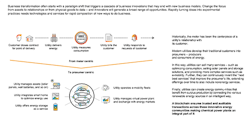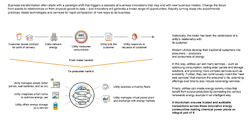First developed as the accounting method for the virtual currency Bitcoin, a blockchain is a decentralized digital ledger that stores data on transactions that occur across a specific network.
Every individual transaction involving a particular asset is recorded using time-stamped data that include the timing of the transaction as well as information about the entities that participated in it. Those data are embedded in encrypted “blocks” that never can be modified. The blocks are disseminated across a network of distributed computers (known as nodes), creating a chain of decentralized yet interdependent records — what amounts to a distributed ledger containing a shared list of encrypted records.
The chain constantly grows as the most recently completed blocks (transactions) are recorded and added in chronological order. Each node gets a downloaded copy of the blockchain as it grows, until the final transaction is completed, allowing everyone in the community to see the shared ledger.
Because that ledger is decentralized, without a single authority to control it, there’s no single point of failure from which records or digital assets can be hacked or corrupted. Every participant in the community can independently verify the authenticity of each transaction. If a participant identifies inconsistencies or fraudulent methods in a block, it can reject the blockchain and avoid being involved in the transaction.
By giving users across the network the ability to independently verify each block in the chain, a blockchain provides a powerful means of confirming the origins and authenticity of a tangible or intangible asset. This peer-to-peer sharing, with open transparency and clear standards of documentation, creates a strong decentralized trust across the network.
Many chemical manufacturers are bullish about blockchain. The decentralized peer-to-peer digital network technology (see sidebar) quickly is gaining traction in the business mainstream. After all, it can help companies optimize a chemical production operation, maximize the value of manufacturing assets and open doors to new business opportunities.
How bullish? In its “2018 Technology Vision”, Accenture reports that 77% of chemical industry executives surveyed expect integration of blockchain into company systems in one to three years, and 71% say blockchain will be critical to their organization over the next three years.
Six Opportunities
In fact, chemical companies already are finding viable applications for blockchain in various facets of their manufacturing business. So, here, let’s look at a half dozen areas of a chemical production operation where blockchain can make a lasting positive impact.
1. Helping manufacturers morph into savvy energy and commodity prosumers. In a highly margin-sensitive and energy-intensive business, the edge goes to producers that can uncover and quickly act upon opportunities to leverage their position in energy and commodity markets.
Blockchain can enable them to do just that by fostering secure and efficient megawatt trading, whether that means selling the excess electricity they produce but don’t use or purchasing electricity when their manufacturing operations require it. As prosumers (producers/consumers), chemical manufacturers can use machine-to-machine integration and interaction within individual plants and across multiple plants, in tandem with process flowsheet models of their industrial equipment, to gain real-time insight into their current and expected electricity needs. They then can move either to buy or sell electricity through a blockchain-enabled network, depending on what the data tell them. Figure 1 provides an idea of how that might work.
Such an approach also could give chemical manufacturers a strong foothold in the circular economy, whereby materials are continuously looped back into the value chain for reuse. (See: “Recycling: Rally ‘Round the Circular Economy.”) Take the case of the ZrCoin Network, a group of Russian scientists that developed a new process for producing zirconium dioxide (ZrO2) using waste material as feedstock. Instead of funding the construction of a new ZrO2 plant, the group founded a ZrO2 trading market on a blockchain platform called ZrCoin, where investors trade ZrCoins, a derivative representing a physical amount of ZrO2. After reaching a critical threshold of investment, a buyback program repays initial investors at a premium in either monetary form or an equivalent value of ZrO2 for the assets they currently hold. The ZrCoin team retains full ownership of its business.
A blockchain platform serves as the framework for the concept, providing efficacy, transparency and security for transactions executed across the network. Perhaps most importantly, the inherent distributed trust within the blockchain enables the market to operate without the need for a third-party organization to regulate and facilitate trading. This direct business-to-business transactional approach can translate into dramatically lower trading fees for participants.
2. Validating asset history. Blockchain gives chemical manufacturers a powerful new tool to maximize the performance and value of their plant assets. It can provide producers with a 360° view of all the engineering, maintenance and repair activities an asset experiences throughout its lifecycle. This ability to seamlessly substantiate asset history, including the authenticity of an asset’s warranty and the history of warranty claims involving an asset, becomes especially valuable in preserving and proving an asset’s book value. In this context, blockchain also can serve to prove ownership when procuring or disposing of an asset.
3. Verifying employee history. Human resources are assets worth maximizing, too. A chemical manufacturer can use blockchain to confirm the qualifications of employees and to ascertain that contractors have the right certifications to work in a chemical plant. This is particularly important with the next generation of technologies and workers arriving on the plant floor. Operating plants and assets safely requires validating that these workers have adequate skill sets.
Figure 1. Chemical makers can leverage their power plants by taking a “prosumer” approach, securely and efficiently trading megawatts to improve margins.
4. Confirming product integrity. Counterfeiting is a major concern in certain segments of the chemical industry. By some estimates, one in four agrichemicals sold in parts of Europe are fake. “We have external data that indicate the problem exists on a very significant scale,” says Marcel Raecker, product security specialist for the global agricultural corporation Syngenta.
With its ability to seamlessly track and trace a product across the entire value chain, blockchain not only can play a role in preventing revenue losses and avoiding costly product recalls related to counterfeit products but also can help ensure regulatory compliance and protect the company brand. Blockchain’s single ledger verifies the integrity of a product via a record that can be traced back to its manufacturer and even to the makers of its precursor feedstocks and ingredients.
As concepts like “farm to fork” and “cradle to cradle” gain strategic and regulatory importance across the globe, companies achieve an advantage when they can easily and transparently demonstrate the integrity of their products and the physical conditions to which those products were exposed along their journey.
5. Recovering from a disaster or accident. The seemingly escalating frequency and intensity of natural disasters requires manufacturers to take proactive steps to protect their operations, customers and data from the supply chain risks associated with disasters and plant accidents. (For pointers on what to do before Mother Nature strikes, see: “Properly Prepare for a Natural Disaster.”) To mitigate disruptions in an operational supply chain, a chemical company could devise a permissioned blockchain that allows recording in almost real time of critical information related to plant operations and supply chains — key data on the volume of raw, intermediate and finished products, as well as production plans and even financial details (invoices, purchase orders, credit details, etc.). When a disaster strikes or an accident occurs, stakeholders within the company’s ecosystem would have the information they need to make critical supply chain decisions. As Accenture explains in its “2018 Technology Vision,” these blockchain-based data become a “golden reference source” for reconciliation and recovery in a post-disaster scenario.
A company could afford access to this same information to insurers and audit agencies for claims and grievance redressals. In addition, because blockchain records are tamper-evident, operational data like process variables and machine operating conditions saved to the chain just before an accident could prove valuable in investigating root causes.
6. Safeguarding collaborative product development ecosystems. Due in large part to environmental and resource challenges, many large chemical manufacturers that are active in precision farming are moving toward a model in which they and other stakeholders, including seed manufacturers, equipment vendors and farmers, share a digital platform that processes huge volumes of data related to soil, weather, plant status, etc., to jointly develop customized, proprietary fertilizer and crop protectant recipes. Here, a blockchain could help create a secure and trusted mechanism for these open innovation efforts.
Just The Start
The chemical industry has only just begun to tap the potential of blockchains. The value of the technology undoubtedly will extend beyond the six uses covered here.
STEFAN GUERTZGEN is senior director industry marketing and communications, chemicals, for SAP, Walldorf, Germany. Email him at [email protected].

